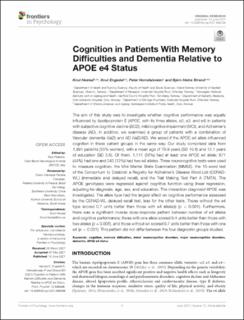| dc.description.abstract | The aim of this study was to investigate whether cognitive performance was equally influenced by Apolipoprotein E (APOE, with its three alleles, e2, e3, and e4) in patients with subjective cognitive decline (SCD), mild cognitive impairment (MCI), and Alzheimer’s disease (AD). In addition, we examined a group of patients with a combination of Vascular dementia (VaD) and AD (VaD/AD). We asked if the APOE e4 allele influenced cognition in these patient groups in the same way. Our study comprised data from 1,991 patients (55% women), with a mean age of 70.9 years (SD 10.8) and 12.1 years of education (SD 3.8). Of them, 1,111 (56%) had at least one APOE e4 allele; 871 (44%) had one and 240 (12%) had two e4 alleles. Three neurocognitive tests were used to measure cognition: the Mini Mental State Examination (MMSE), the 10-word test of the Consortium to Establish a Registry for Alzheimer’s Disease Word List (CERAD-WL) (immediate and delayed recall), and the Trail Making Test Part A (TMTA). The APOE genotypes were regressed against cognitive function using linear regression, adjusting for diagnosis, age, sex, and education. The interaction diagnosis∗APOE was investigated. The allele type had the largest effect on cognitive performance assessed by the CERAD-WL delayed recall test, less for the other tests. Those without the e4 type scored 0.7 units better than those with e4 allele(s) (p < 0.001). Furthermore, there was a significant inverse dose-response pattern between number of e4 alleles and cognitive performance; those with one allele scored 0.4 units better than those with two alleles (p = 0.006), and those without e4 scored 0.7 units better than those with one e4 (p < 0.001). This pattern did not differ between the four diagnostic groups studied. | |

